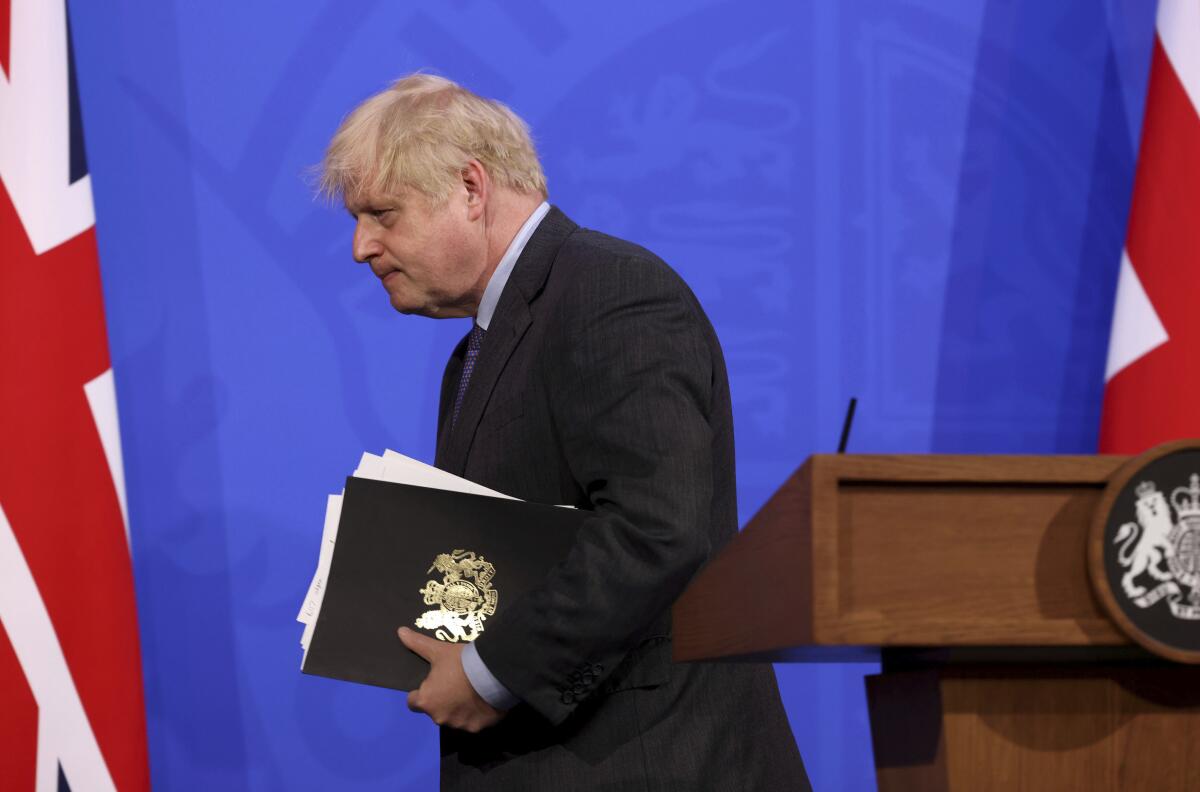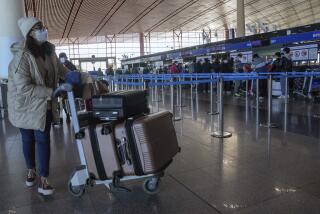Delta variant causes new lockdowns and coronavirus restrictions across the globe

To many people, the worst days of the COVID-19 pandemic appear to be over: The rescheduled Tokyo Olympics are set to begin next month — albeit with safety restrictions — countries have taken steps to try to restart their economies, and 3 billion doses of vaccines have been administered across the globe.
But the highly contagious Delta variant is serving as a harsh reminder of the unrelenting nature of a virus: To stay alive, it adapts and mutates.
The variant’s quick spread globally is causing countries to again take precautions such as reinstating lockdowns, travel restrictions, curfews and mask mandates, medical and government officials said.
The variant has been identified in at least 96 countries, according to the World Health Organization.
“This is a reminder that an infection anywhere is potentially an infection everywhere,” UCLA epidemiologist Anne Rimoin said in a phone interview this week. “We’re a global community, with constant interaction and travel, and when we see cases start to surge in one place in the world, it should be a stark reminder that we, too, could potentially be susceptible.”
During roughly a year and a half, the coronavirus has resulted in more than 3.9 million deaths worldwide, including 605,000 deaths in the U.S.; and about 183 million infections, according to the Coronavirus Resource Center at Johns Hopkins University — and the official numbers are certainly a vast undercount. The Delta variant is thought to be more than twice as transmissible as the original coronavirus strains, and both the WHO and the U.S. Centers for Disease Control and Prevention consider it a “variant of concern.”
The Delta variant has already spawned a new offshoot in India dubbed “Delta-plus,” which may have even more increased transmissibility. The world’s second-most populous country faced a deadly wave of coronavirus infections this spring, recording millions of cases a day in March and April. India had seen a total of nearly 400,000 COVID-19 deaths and in excess of
30.4 million infections as of Thursday — official numbers that are known to be far below the actual totals.
The Indian government urged all its states to impose coronavirus restrictions on Monday. It also upheld its current national COVID-19 directives, which include mask wearing, social distancing, a ban on liquor and tobacco sales and fines for people who spit in public.
Delta doesn’t seem to pose a significant threat to those who have been fully inoculated: A recent study from a United Kingdom government agency found that getting both doses of the Pfizer-BioNTech vaccine was 88% effective at preventing COVID-19 caused by the Delta variant, while two doses of the AztraZeneca vaccine were 60% effective, Dr. Anthony Fauci said at a briefing by the White House COVID-19 Response Team. Moderna and Johnson & Johnson both announced their vaccines are effective at “neutralizing” Delta and other variants of concern.
But the variant is “spreading rapidly among unvaccinated populations,” WHO Director-General Tedros Adhanom Ghebreyesus said in a news conference last week. More than half of the U.S. population has received at least one dose of the COVID-19 vaccine, but in South Africa, which imposed new strict coronavirus restrictions Monday due to rising cases driven by the Delta variant, less than 1% of the population has been vaccinated, according to the Johns Hopkins Coronavirus Resource Center.
The South African government closed schools, imposed curfews, suspended alcohol sales and in-person dining, and prohibited all indoor and outdoor gatherings in response to new outbreaks. Cases from the last month make up more than 15% of the country’s 1.9 million cases since the start of the pandemic.
“The real challenge with the variants is global,” said Tom Bollyky, director of the global health program at the Council on Foreign Relations.
“The U.S. and Europe have held onto vaccines in the hopes that there’ll be an increase in the rate of vaccination, and that they might be needed for boosters, etcetera,” Bollyky said in an interview. “The variants change that conversation. There isn’t as much justification for not sharing them — now — to places where these variants are going to take off and have quite devastating consequences.”
Indonesia planned to launch emergency measures Friday to curb its worst outbreak of COVID-19 since the start of the pandemic.
The Southeast Asian nation and world’s fourth-most populous country has been ravaged by the Delta variant, which was believed to have spread after millions of Indonesians traveled home to mark the end of Ramadan.
New daily case counts have hovered over 20,000, more than four times greater than a month ago. Hospitals in the capital, Jakarta, are reportedly near full capacity, and there’s growing concern that the country’s oxygen supply could be strained.
Indonesian President Joko Widodo on Thursday announced lockdown measures on the islands of Java, home to 60% of Indonesia’s more than 275 million people, and Bali, the country’s premier tourist destination. Restrictions include the closure of malls, parks and places of worship. Restaurants will only be allowed to sell food for takeout.
At least 59,534 Indonesians had died of COVID-19 as of Friday.
Australia, whose handling of the coronavirus has largely been viewed as a success story with fewer than 1,000 deaths throughout the pandemic, imposed several lockdowns as the Delta variant began to spread.
“The Delta variant is proving to be a far more difficult element of this virus than we have seen to date,” Prime Minister Scott Morrison said.
Ben Dickinson is a resident of Perth, which went into a lockdown Tuesday. He said he was worried the increased transmissibility of the Delta variant would cause a long-term lockdown that the country hasn’t seen since the first days of the pandemic, due to Australia’s low vaccination rate of only about 11% .
“There’s a concern that we might be having an actual outbreak as the rest of the world is getting over it,” Dickinson said.
He said the current lockdown feels like the pandemic has “snatched defeat from the jaws of victory.”
Britain was supposed to lift its coronavirus restrictions on June 19, which included reopening businesses like nightclubs and theaters, as well as allowing more fans at events such as the Wimbledon tennis tournament. But five days before the restrictions were to have ended, Prime Minister Boris Johnson pushed back the date by a month. The Delta variant is responsible for almost all new cases in the country, according to scientists at Imperial College London.
Malaysia also delayed lifting its coronavirus restrictions indefinitely, which was scheduled to happen Monday, according to the state-run media outlet Bernama.
Hong Kong, Germany and Taiwan are among the places that imposed new travel restrictions to and from countries such as the U.K., Russia and Israel that have widespread cases involving the Delta variant.
The U.S. is also facing concerns about the variant spreading.
From May 9 to May 22, Delta made up less than 3% of the coronavirus samples that were genetically sequenced across the country. But from June 6 to June 19, that figure rose to more than 20%, Fauci said.
“Globally, we’re starting to see these restrictions on travel and daily life as this variant expands, and it’s not at all surprising,” Rimoin said.
Israel seemed to have the pandemic under control, recording fewer than 100 cases every day at the beginning of June. But on June 20, cases jumped to triple digits per day. Israel last week reinstated its indoor mask mandate and is maintaining its closed borders to tourists.
Although some countries are reimposing coronavirus restrictions and lockdowns, big events are still returning and many areas of the world continue to reopen.
Spain’s prime minister announced he was lifting the country’s mask mandate on June 18. The NBA welcomed fans back for its playoff season, and the Tokyo Olympics are set to begin July 23.
Maria Van Kerkhove, technical lead on COVID-19 for the WHO, said at a recent news conference that world leaders must be wary about their reopening plans.
“We are already starting to see some consequences of these events with increasing transmission again,” she said.
Tebor reported from Los Angeles. Times staff writers Emily Baumgaertner in Los Angeles and David Pierson in Singapore contributed to this report.
More to Read
Sign up for Essential California
The most important California stories and recommendations in your inbox every morning.
You may occasionally receive promotional content from the Los Angeles Times.











